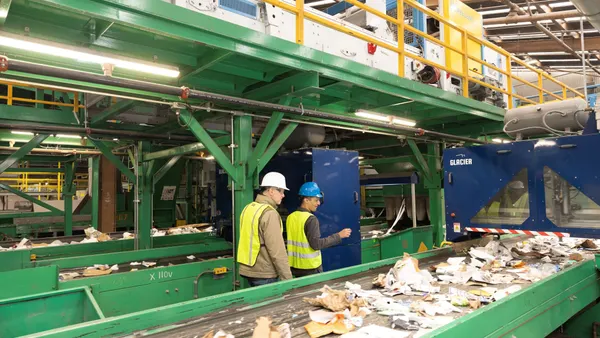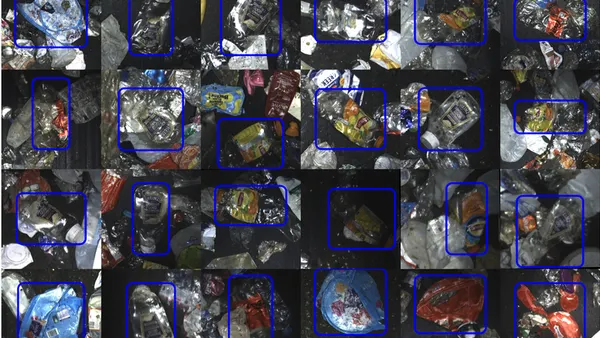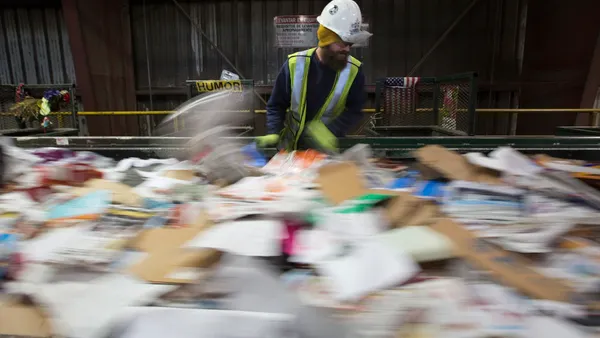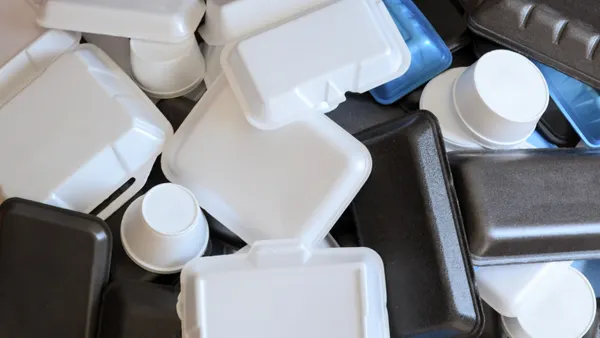Dive Brief:
- The five publicly traded North American waste and recycling companies recently reported a combined $762 million in recycling revenue through the first six months of 2019. This a drop of nearly 9% from about $837 million for the same period in 2018.
- Recycling revenues increased by 7.7% for Casella Waste Systems, and dipped less than 1% for Republic Services. The others, including Waste Management and Waste Connections, saw double-digit declines. Advanced Disposal Services experienced the largest change, with recycling revenue down by more than 42%.
- Although some companies cited positive signs, such as Waste Management's $6 million improvement in operating earnings before interest, tax, depreciation and amortization (EBITDA) year over year, all but Casella cited recycling as an ongoing headwind through at least the end of this year.
Dive Insight:
Many of these companies were reporting an uptick in recycling revenues through the first half of 2017. News of China's initial scrap import restrictions had just come out weeks before, but many executives sought to downplay the effect it would have on their business.
Comparisons to 2017 recycling revenues aren't directly reliable because of 2018 changes in revenue recognition standards that affect the way certain costs are counted. Still, the fact that Waste Management was touting a $90 million increase in recycling revenues during Q2 of 2017 is a sign of just how much has changed. For just about every major company, the stark decline in commodity values has resulted in multimillion-dollar hits to EBITDA and revenue.
During Waste Management's most recent earnings call, CEO Jim Fish described the recycling business as having "fallen off a cliff." The company's 10-Q laid out the driving factors in more detail than most: "We have seen a decreased demand from paper mills around the world which has driven prices to historical low averages. The cardboard packaging industry has been impacted by slower global demand, retail store closures and e-commerce packaging efficiency." Fish went further in the call, citing Amazon's decreased packaging demand as a key factor.
With commodity prices down by double digits, the public companies' response has largely been to raise prices as much as possible, attempt to reopen contract language to reduce their share of risk and, in some cases, seek an exit strategy. They so far have proved less interested in changing much about the core single-stream model itself, aside from looking for ways to cut certain materials or optimize sorting procedures.
Less is known about the official strategies of private haulers and materials recovery facility operators, which generally have a smaller footprint than most of the public companies, but reports indicate many are taking a similar approach.
The reason Casella's recycling operations appear to have turned around more quickly is the preexisting use of an adaptable "sustainability/recycling adjustment" fee for certain customers. The company also has fewer contracts to work through than its larger peers.
Waste Connections, however, will have to wait longer to change terms given much of its recycling business is under franchise contracts. Others are in various stages of renegotiating their own municipal contracts.
All of these companies are seeing their broader solid waste businesses more than overcome any recycling losses. The expectation that additional domestic paper mill capacity will come online in 2020 leaves optimism about where commodity prices may be headed.










